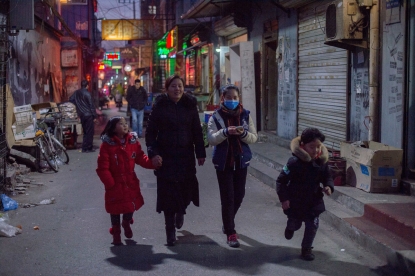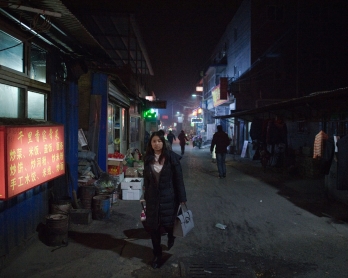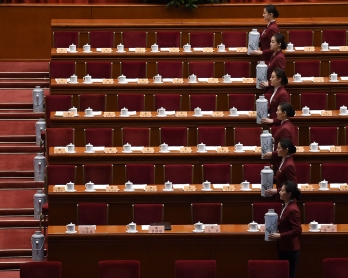The powerless
Beijing -- One of the most important things that you can do in photojournalism is to report on human rights issues. That’s one of the things that drives me the most. I guess that’s why for months now I have been doing the story of the migrant villages around Beijing.
These villages have sprung up on the outskirts of the Chinese capital to house the people who come from the countryside to perform the most menial of jobs in the sprawling city. They are usually the cooks, the cleaners, the movers. They tend to be the city’s poorest residents and in my experience the friendliest. Over the past several months the government has been intent on clearing these villages, so that the people in them go home.
I first stumbled on the story nearly a year ago, when I photographed the village of Black Bridge. It was very close to the city centre and completely surrounded by high-speed train tracks. An island, if you will. I went there because I was curious and stayed on because I found it warm and friendly (which can be a breath of fresh air living in Beijing) and beautiful, filled with life and energy.
 Black Bridge, February, 2017. (AFP / Nicolas Asfouri)
Black Bridge, February, 2017. (AFP / Nicolas Asfouri)After that, I began to photograph other migrant neighbourhoods. This particular one, Houchang Village, was further out of town and smaller. I went there throughout the summer. I went regularly whenever I could get away from the news to try to find good moments, good shots. After a while, word started to go around that there might be something happening. Everyone was saying that the village might be demolished. So the text reporter, Joanna Chiu, and I were waiting and waiting. Ideally we wanted to try to capture the moment of eviction. But you never know when that will happen. The authorities just come at will.
 (AFP / Nicolas Asfouri)
(AFP / Nicolas Asfouri)And so one day when we came there, there were almost no people left. The area that I had photographed the most was basically sealed off, with entrances cemented and topped with barbed wire. One door was open and we went in. It happened to be an area of the village where I had taken a lot of photographs because it teemed with life. Now it was a ghost town. I started to shoot and then I started to remember some of the places that I had shot previously.
 (AFP / Nicolas Asfouri)
(AFP / Nicolas Asfouri)I thought right then and there that this should make for some very strong images. There were so many homes that were now sealed off by tapes stamped with government seals, where before there used to be human beings. So I went back to the office and printed the photos that I had taken earlier. I had to, because if I had worked from memory, it wouldn’t be the same angle. This way I actually had the pictures in my hand, so I could make a new one as similar as possible to the original.
 (AFP / Nicolas Asfouri)
(AFP / Nicolas Asfouri)I think the photos came out pretty nicely. We got lucky in that this part of the village hadn't been demolished yet. I didn’t want to just see destruction, I found this much more interesting. The people may be gone from here, but when you put the before and after photos together as a combo, you see the life and death of the village in a way.
 (AFP / Nicolas Asfouri)
(AFP / Nicolas Asfouri)There was one place that had five corridors of let’s say 20 rooms on each side. There used to be over a hundred households there before. Now there were a handful of people left, just waiting for their paychecks before going back home. Lin Huiqing, a mover, was lucky in that he has a cousin who is living in a house across the road in the same village, so he just moved in with him.
 (AFP / Nicolas Asfouri)
(AFP / Nicolas Asfouri)There are many villages like this all around Beijing. The people who live in them tend to be quite poor, but the meager money that they make by the capital’s standards is quite a large sum compared to what they would be earning at home.
 (AFP / Nicolas Asfouri)
(AFP / Nicolas Asfouri)The people that we talked to seemed quite resigned to their fate. I guess that’s because there isn’t much that they can do about it. They have no choice. One woman told us exactly that. “What can I do?” she said.
 (AFP / Nicolas Asfouri)
(AFP / Nicolas Asfouri)I suppose that’s why I like covering this story as well. These people are completely powerless. If they have to move on, they’ll move on. There isn’t much that they can do about it and even if they try to do something about it, they’ll just have more problems.
 (AFP / Nicolas Asfouri)
(AFP / Nicolas Asfouri)We plan to continue going back to these villages, because their story is still unfolding.
This blog was written with Yana Dlugy in Paris.
 (AFP / Nicolas Asfouri)
(AFP / Nicolas Asfouri)





